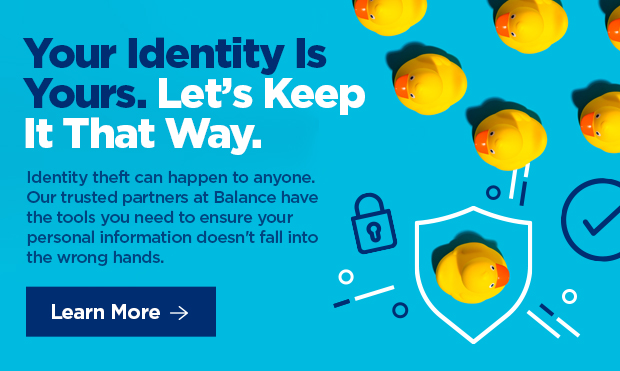Has a Nigerian prince emailed you to tell you that you’ve won the Nigerian national lottery?
Has a telemarketer called with a lucrative business opportunity which only requires your credit card information to get started?
If so, you (like many Americans) stood in the crosshairs of a criminal attempting to steal your hard-earned cash, or even worse, your identity. Telemarketing tricks, phishing emails, identity theft and other scams bombard consumers on a daily basis. Having a basic understanding of the tactics they use and the fundamental protective actions you can take is your best defense in keeping your identity and money safe.
1. Phishing Email Scams: Don’t Take the Bait
Scam: An email just popped in your inbox informing you there’s an issue with your account information or that you qualified for an exclusive, limited-time offer. It looks like it is from a legitimate company. Should you click on the link in the email? Absolutely not.
What the scammer targets: These phishing emails look like a legitimate account services page for a financial institution or a well-known site such as Netflix, PayPal, or Amazon. Scammers dangle this email “bait” to hook you into providing your username, password, credit card info, financial account data or other personal information. By clicking a link, malware can also be installed on your computer.
What you should do: Never trust an email that asks for account details or asks you to reset a password via an unverified link. You should also:
- Update your security settings to install security software patches on your web browsers routinely.
- Use trusted links to a company’s website and never click on a link in a suspicious email.
- Immediately contact the company by phone (using the number provided on the company’s website, NOT the email you received) to confirm the information in the suspicious email is accurate.
- Never open an attachment in an email unless you know the sender and scan the attachment with anti-virus software first.
- Use a trusted email provider like Gmail or Outlook which will help filter out phishing emails.
- Install anti-virus software on your computer to keep your online activities safe.
2. Steer Clear of Pyramid Schemes
Scam: Your coworker, friend or neighbor has a “great business opportunity” for you! All you need to do is pay a modest start-up fee and begin recruiting more members to boost your profits.
What the scammer targets: These multi-tiered marketing scams thrive by continually bringing in new members to pay profits to more senior members.
What you should do: Politely refuse to participate. However, if you find yourself strong-armed into a pyramid scheme, immediately take the following actions:
- Verify the legitimacy of the opportunity with the Better Business Bureau.
- Refuse to provide your financial institution account information and decline requests to recruit new members.
- Report the scheme by contacting your state attorney general.
- Ultimately, take a cautious approach to any business opportunity which thrives on recruiting new members into a tiered profit model.
3. Protect Yourself From Identity Theft
Scam: An unauthorized party, without your knowledge, accesses your personal information with the intent to commit fraud.
What the scammer targets: Some thieves target your credit card data or other financial information. Others take this a step further and use your Social Security number, date of birth and other personal data to establish new accounts in your name or even try to assume your identity entirely.
What you should do: Protect yourself from identity theft through the following actions:
- Regularly change your account passwords including your email, financial institution, social media accounts, online shopping accounts and more.
- Order a free annual credit report to view a complete list of accounts linked to your name and Social Security number.
- Shred your mail containing account information, your date of birth, Social Security number or other personal information.
- Routinely review your online account activity to look for unauthorized transactions.
- Report all instances of identity theft and get help with recovery steps.
- Immediately contact your financial institution or other online account providers if you suspect a criminal is using your personal data for fraudulent activity.
- Victim of identity theft? Use our checklist to help you reclaim your identity.
4. Telemarketing Scams
Scam: You settled down to dinner with your family and the phone rings. The scammer on the line tries to convince you to purchase products, set up services, invites you to an investment seminar, or even falsely accuses you of committing a crime.
What the scammer targets: Like phishing scams, these criminals are in search of access to personal or financial information they can exploit for profit.
What you should do: Be wary of any unsolicited caller trying to sell you products or threatening you with legal action.
- Do not say a word! Some of these conversations now start with “Can you hear me?” Simply by replying, “Yes,” your voice can be recorded… and used as proof that you agreed to the terms of the scam.
- Hang up. When you hang up, most telemarketers will move on to the next victim on the list.
- Report them. After you hang up, contact the Federal Trade Commission online to file a complaint.
- Register with the National Do Not Call Registry.
5. Threats From IRS Imposters
Scam: An “IRS agent” contacted you claiming you owe back taxes and needs to verify your personal and financial information.
What the scammer targets: This imposter hopes your fear of the IRS will translate into a big payout for them in the form of a wire transfer, prepaid debit card or other forms of payment you send.
What you should do: Exercise extreme caution when interacting with anyone who claims they are from the IRS. The IRS typically does not contact people by phone. You will also want to:
- Ask for the caller’s contact information. All IRS agents will provide you a name, badge number and callback number.
- Report them right away. Contact the Treasury Inspector General for Tax Administration.
- Contact the IRS to confirm the details in the call or letter you receive are accurate.
- Be wary of threats since the IRS does not make a habit of threatening consumers with an arrest.
6. Someone You Don’t Know Wants to Send You Money
Scam: There are many variants to this scheme. Someone says they’d like to send money to you (via wire transfer, by fraudulent check, or by you setting up an external account for them). Whatever the request, there is a demand that follows, either for your bank account information, or money in return specifically in the form of gift cards, money orders and/or bank transfers.
What the scammer targets: The money that is being sent to you is most likely stolen, or fraudulent in some way. If you deposit this money, and the payment is subsequently rejected, you could be out the deposited money, liable for any associated fees, as well as any amount you may have sent in return. Bottom line? If someone you don’t know wants to send you money and wants some in return, it’s probably too good to be true.
What you should do: Never give out your banking information. Avoid sending money to someone you don’t know or have never met in person. If you have any doubt if you should accept funds such as a check, money order, or wire, call the financial institution the funds are coming from or drawn on first. Never link accounts in which you are not an owner for the purposes of transferring money between accounts. If you currently have a linked account in which you are not the primary owner, you should delete it immediately
Scammers thrive on your lack of knowledge and experience with the tactics they use. However, armed with a basic understanding of how they operate, you may be able to help protect yourself. Share this information with your friends, family and coworkers to help protect them from financial scams.






Comments Section
Please note: Comments are not monitored for member servicing inquiries and will not be published. If you have a question or comment about a Quorum product or account, please visit quorumfcu.org to submit a query with our Member Service Team. Thank you.